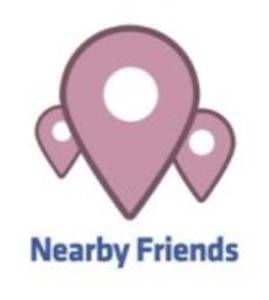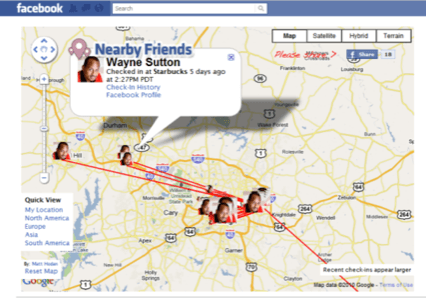Nearby Friends is a new Facebook application which taps into the recently launched Facebook Places check-in service to locate all your Facebook friends plotted on a Google Maps interface. The app, a simple tool that places Facebook profile photos as a pin on the map, doesn’t limit itself to where your friends are right now, it actually displays their entire Facebook check-in history, as lines traversing the map. With the app installed, you can actually track a friend’s travels, easily identifying their favorite hangouts, daily treks, their workplace and more. Is this the first Facebook Places cyber-stalking tool? Or just a handy way to see what your friends are up to?

Nearby Friends: Cyber-Stalking Tool for Places?
At first glance, the Nearby Friends app didn’t really impress. Facebook friends on a map – haven’t we seen that before? But after further testing, the true purpose of the app became clear: this tool is ideal for cyber-stalking your Facebook friends. Whether or not that was the developer, Matt Hodan’s, intention is unclear. His background as an entrepreneur, web developer and financier at companies including J.P. Morgan, Genstar Capital and Y-Combinator, hints that this app was likely just something he thought would be cool, without considering its greater ramifications.
(Update: Matt tells us that the app Nearby Friends “is no more for cyber stalking than Facebook is, which is to say, that that is exactly what it is designed for at some level.” He explains that “the only people who appear on Nearby Friends are people who choose to publish their location by checking-in. It encourages friendly interaction by making it easy to see what your friends are doing and where. That said, there are certainly valid concerns with publishing this kind of information. Could someone rob your house because they see you’re out of town? Sure. My recommendation: Don’t announce that you’re out of town by checking-in if doing so puts you at risk!”)
Now granted, the tool can’t track anyone and everyone using Places – it only displays your own friends, meaning you and the person tracked already have a relationship of some sort. In addition, not all users on Facebook do or ever will use Places. Most users are still hesitant about location-sharing technology, as the New York Times reported this weekend, citing research we wrote about in July.

The Impact of Facebook Places on Privacy
That being said, it’s worth considering how an app like this could possibly be used for less-than-savory purposes. The Facebook Places feature has been launched with a confusing array of privacy settings, which apparently allow friends to check you in to a venue (“check in,” meaning announce that you’ve arrived at a particular venue, like a restaurant, bar, club, business, etc.) even if you never authorized the service to do so. To be excluded from check-ins like this, you must explicitly turn the feature off in your Facebook settings.
This is Facebook’s M.O. when it comes to launching new functionality: everything is generally turned on by default. Why’s that? Because the company understands that the majority of its user base neither knows nor cares about how each new feature impacts their privacy. For example, even when the Facebook privacy backlash was underway earlier this year, the service continued its unparalleled growth.
Common Sense and Checking-In
As Facebook becomes more heavily used for associating with people beyond just close friends and family, the consequences of publicly sharing your location become more important to thoroughly understand. As Hunter Walk recently explained via blog post on technology news website TechCrunch, there are a number of reasons some check-ins need to remain private. Although his post was an analysis of rival check-in service Foursquare’s “off the grid” feature and its use cases, the examples are true for any location-based app. For instance, you don’t want your boss knowing everywhere you check-in (interviewing in another city? not actually sick?) and you don’t want everyone to know about your private moments out in the world at large.
Sure, you could simply not check-in, but then you lose some of the benefits of these new and growing services. Benefits that include everything from mobile coupons to a virtual location history that could eventually be used to surface recommendations for you. (Loved that seafood restaurant? Then you have to try this other one!)
“Who Cares?” or “What Were We Thinking?”
With Facebook’s large user base – now half a billion strong – there are going to be a number of people who start using Places without thoroughly understanding the privacy settings and what they mean. This raises several questions: how much of the burden of managing privacy should be placed on the user and how much on the service? Is cyber-stalking really and truly a threat? With increased awareness of location-based sharing, will users in turn learn to better understand when and where it’s appropriate to share?
According to Wayne Sutton, a partner and Business Development Marketing Strategist with location-based service TriOut (and who also kindly allowed the above screenshot’s use), cyber-stalking is a real concern that everyone should think about. However, he says, most of the time it can be avoided using “common sense” and taking advantage of the privacy settings within your app of choice. “Every individual will have to consider their surroundings, friends approval, app settings and relationship status with potential stalkers before checking in,” he explains. “Sadly I don’t think enough people consider who they should friend and/or manage their friends list to prevent cyber stalking from happening.”
Perhaps it’s still too early to thoroughly understand the greater impacts of all this social, location-based sharing. Will we look back wondering why there was ever such a fuss about all this to begin with? Or will we wonder, as a recent commenter points out on a previous post about Places, “what were we thinking?”
















